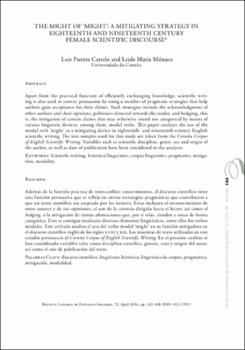The might of ‘might’: A mitigating strategy in eighteenth and nineteenth century female scientific discourse
Fecha
2016Resumen
Además de la función práctica de intercambiar conocimientos, el discurso científico tiene una función persuasiva que se refleja en ciertas estrategias pragmáticas que contribuyen a que un texto científico sea aceptado por los lectores. Estas incluyen el reconocimiento de otros autores y de sus opiniones, el uso de la cortesía dirigida hacia el lector, así como el hedging, o la mitigación de ciertas afirmaciones que, por sí solas, tienden a sonar de forma categórica. Esto se consigue mediante diversos elementos lingüísticos, entre ellos los verbos modales. Este artículo analiza el uso del verbo modal ‘might’ en su función mitigadora en el discurso científico inglés de los siglos xviii y xix. Las muestras de texto utilizadas en este estudio pertenecen al Coruña Corpus of English Scientific Writing. En el presente análisis se han considerado variables tales como disciplina científica, género, sexo y origen del autor, así como el año de publicación del texto. Apart from the practical function of efficiently exchanging knowledge, scientific writing is also used to convey persuasion by using a number of pragmatic strategies that help authors gain acceptance for their claims. Such strategies include the acknowledgment of other authors and their opinions, politeness directed towards the reader, and hedging, this is, the mitigation of certain claims that may otherwise sound too categorical by means of various linguistic devices, among them, modal verbs. This paper analyses the use of the modal verb ‘might’ as a mitigating device in eighteenth- and nineteenth-century English scientific writing. The text samples used for this study are taken from the Coruña Corpus of English Scientific Writing. Variables such as scientific discipline, genre, sex and origin of the author, as well as date of publication have been considered in the analysis.





